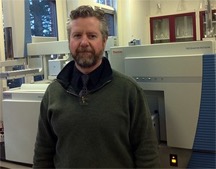
Dr. Jason White, of the
Connecticut Agricultural
Experiment Station, will present on agriculture, water supply and the expected population growth at the spring water seminar series at 2:30 p.m. Wednesday, Feb. 1 at the Hardin Hall Auditorium, East Campus.
His research:
Increasing population growth and a changing climate will exert significant pressure on already stressed agricultural production systems.
Nanotechnology has the potential to dramatically increase global food production and food security. However, any widespread use of nanomaterials in food production must occur with a thorough understanding of both the risks and benefits, including an assessment of the fate and effects of these materials in the environment. Work at the Connecticut Agricultural Experiment Station is focused both on novel applications of nanomaterials (NM) to suppress crop disease, as well as on efforts to understand the mechanisms of NM toxicity on biota. A synopsis of these two complementary programs will be presented.
Plant pathogens reduce agricultural productivity by 20%, resulting in billions of dollars of losses from reduced yield, wasted resources, and compromised food quality; novel approaches to suppress crop disease are clearly needed. Plant micronutrients are critical to disease resistance but availability in soil is low and foliarly applications are often poorly absorbed/translocated.
However, nanoparticle (NP) forms of nutrients may be absorbed and translocated more effectively. Greenhouse and field investigations have shown that nanoscale micronutrients can increase the growth and yield of tomato, eggplant and watermelon in soil infested with the pathogens Verticillium or Fusarium.
Current efforts are focused on understanding the mechanisms of disease suppression, as well as on optimizing amendment strategies to maximize food production.
Significant effort is being made to understand the fate and effects of NM in agricultural systems. Experiments are focused on three areas: assessing the molecular mechanisms of NP phytotoxicity, evaluating the trophic transfer of NP within the food chain, and characterizing the effect of NP exposure on the fate co-contaminants. Proteomic and transcriptomic data indicate that plant response to NP exposure and subsequent trophic transfer is often significantly different from corresponding bulk/ionic materials. NP co-exposure can also significantly alter co-contaminant accumulation and toxicity, but these effects again vary significantly with the conditions of exposure. Collectively, this work shows that although NP/NM use can significantly increase food production, important questions remain unanswered and any application of nanotechnology in agriculture should be pursued with caution.
###
The Water Seminar series is organized and sponsored by the School of Natural Resources and the Nebraska Water Center, part of the Daugherty Water for Food Global Institute, with support from Institute of Agriculture and Natural Resources.